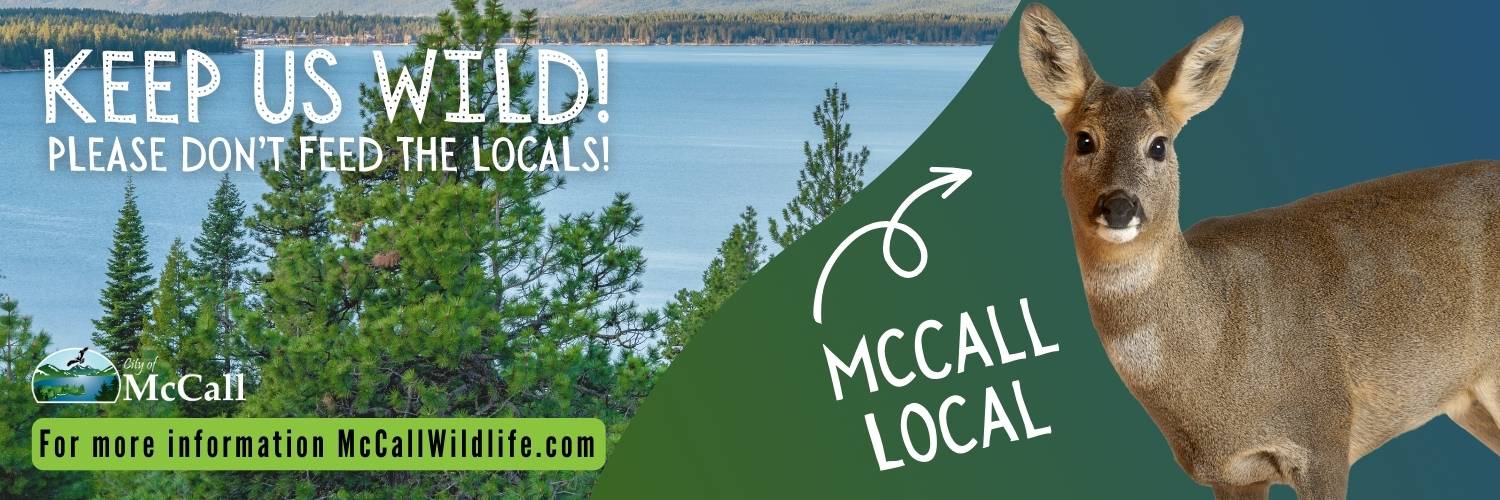
The McCall City Council passed a Wildlife ordinance on September 28th prohibiting the feeding of wildlife in city limits.
McCall, Idaho, October 2, 2023 – In a notable decision that signifies a commitment to wildlife preservation, the McCall City Council unanimously passed an ordinance on September 28th, prohibiting the feeding of deer within the city limits. After more than five months of extensive outreach and education, this decision reflects McCall's commitment to safeguarding its natural heritage and fostering harmony between its community and the surrounding wildlife.
The ordinance, a result of careful consideration and valuable public input, enforces a $100 fine for a first offense. Subsequent violations will be treated as misdemeanors, underscoring the city's firm stance on this issue. By implementing these measures, McCall aims to ensure the well-being of its native deer population while fostering an environment where both humans and wildlife can thrive together.
Assistance with the disposal of deceased wildlife:
Due to concerns regarding Chronic Wasting Disease (CWD), Idaho Fish and Game is organizing the collection of deer, elk, and bear carcasses. Pick-up days are scheduled for Mondays and Thursdays, with exceptions made for federal holidays, where collection will occur on the subsequent business day. For assistance with deer, elk, and bear pick-ups, kindly contact Idaho Fish and Game at 208-634-6866.
For the removal of deceased animals of other species on your property, several companies offer this service at the owner's expense. The City of McCall and Idaho Fish and Game has contracted High Desert Wildlife and Pest Solutions for this purpose. To schedule a pick-up for an animal on your property, please reach out to them at:
Field: (208) 590-3364
Office: (208) 599-5222
Website: highdesertwildpest.com
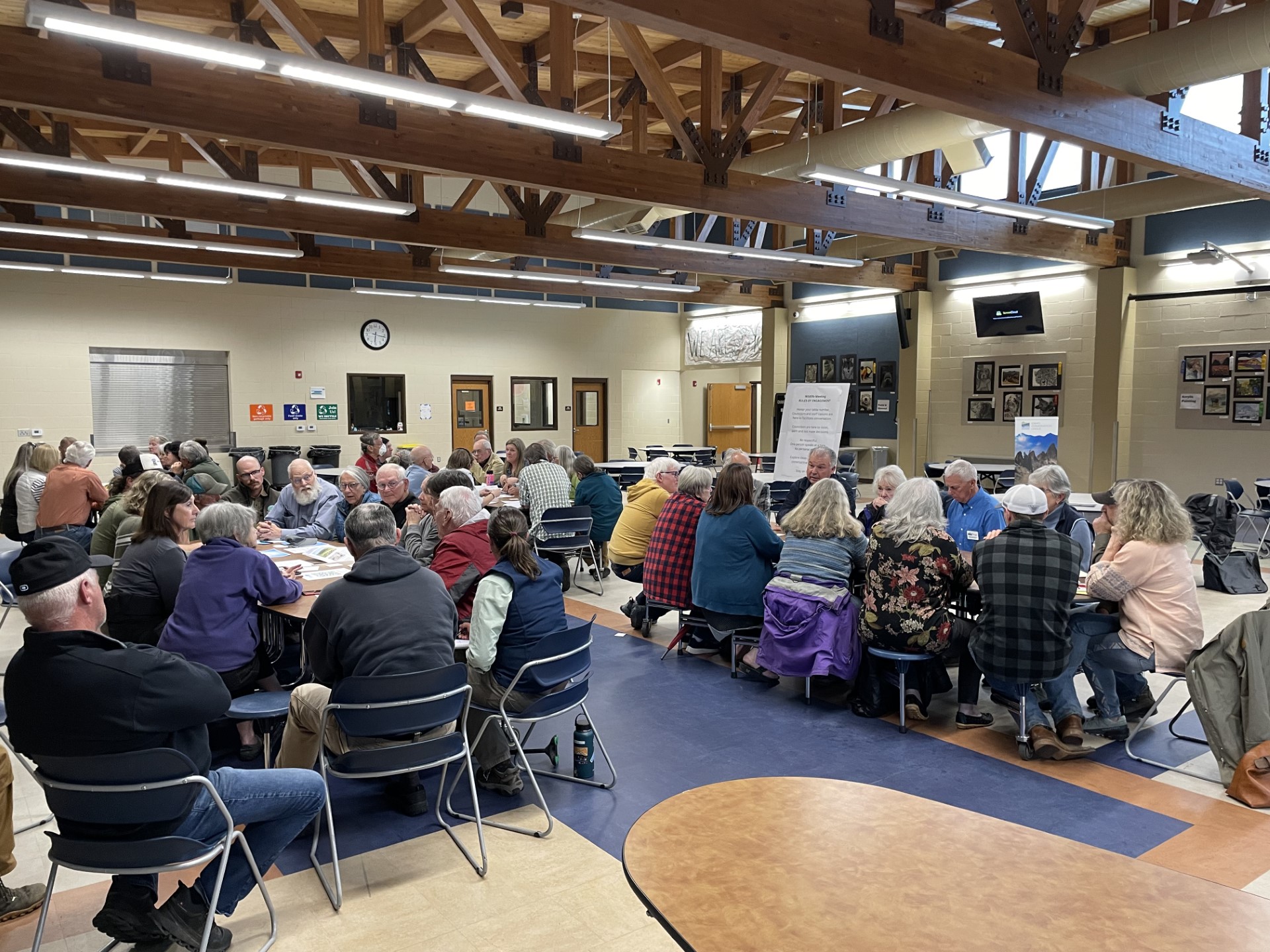
Feeding wildlife causes problems for people and animals.
Feeding some wildlife, such as birds and squirrels, can be a fun way to interact with them, but it’s not the same for deer, elk, and other wild animals. Those animals have evolved to survive in the wild without human assistance. When people feed them, especially if they become habituated to handouts, it can hurt individual animals, grow unsustainable herds, damage property, create traffic hazards, attract large predators, and more. That’s why you should resist the temptation to feed them and discourage your neighbors from doing it, too.
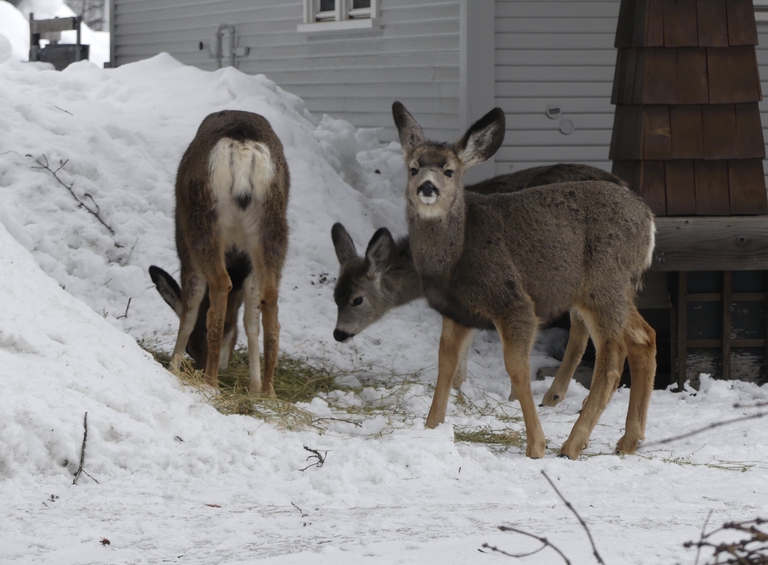
Feeding elk or deer in town and adjacent to busy streets is hazardous for both deer and motorists. Fish and Game staff responds to dozens of reports of injured or road-killed deer in and near towns. The problem gets worse during winter when deep snow means roads and streets may be the only routes for animals to travel. Fish and Game do not have the capability to rehabilitate injured wildlife, so when a deer is hit and appears unable to recover, it must be put down.
Deer, elk, and moose can be aggressive, especially when they lose their fear of people. Though deer are typically docile, under stressful circumstances, they have a flight-or-fight response and sometimes respond to perceived threats with aggression. Does with young fawns have chased people and attacked dogs, and bucks in breeding season can behave aggressively, including injuring people.
When deer or elk congregate or repeatedly feed in the same spot, predators take a cue from their routine. Deer and elk are mountain lions’ primary prey, and the large cats will hunt whatever is most easily available to them. Fish and Game receives multiple reports of mountain lions in towns each year, and they can pose a threat to people and pets. If there’s a conflict between mountain lions and people, it can result in lions being euthanized.
Deer and elk won’t stop eating when you’re done feeding. When deer or elk start congregating in an area, they will eat whatever is available, which may be landscaping or ornamental plants. This can damage property and cause conflicts between people who are feeding and neighbors whose property is damaged.
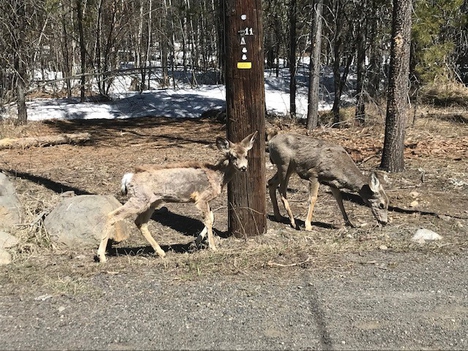
Problems for animals
The food that people provide can be harmful to deer.Deer digestive systems are equipped to deal with small bits of low-quality food, especially during winter.
Large amounts of highly nutritious food, such as alfalfa or pellets, can overwhelm their digestive system and lead to bloat and potentially death, especially in young animals.
Feeding elk or deer can stop them from migrating to where natural food is available. Most mule deer migrate to lower-elevation ranges during winter. Feeding over time may cause animals to lose their knowledge of migration routes to winter range.
Damage to native vegetation near feeding areas can also be a problem. Trees and shrubs, especially aspen and willow, can become heavily damaged and take a long time to recover.
Crowding creates conditions that can lead to disease outbreaks.
Wild animals need to remain wild. It’s understandable that people enjoy seeing them close to their homes, but when animals lose their wildness, they’re likely to lose their innate fear of humans and become too comfortable around people and in towns. That behavior can also be passed on to the next generation.
But Doesn’t Fish and Game feed big game?
The short answer is no, except for emergency reasons, such as extreme winters. During most winters, snow depths and temperatures do not threaten big game herds, and most of the animals have enough fat reserves to carry them through until spring.
Reasons for temporary, emergency winter feeding may include extreme weather conditions where big game forage becomes limited, or unavailable, for prolonged periods, preventing conflicts between big game and agriculture operations, and public safety concerns, such as big game herds congregating near freeways.
Overall, Fish and Game manages big game herds so naturally available forage can sustain their populations, and people can help by not feeding animals and keeping the “wild” in wildlife.
For more information, please visit: idfg.idaho.gov
Information Featured courtesy of IDFG Brochure - Do Not Feed Big Game Animals, 5/2020 Glenna Gomez
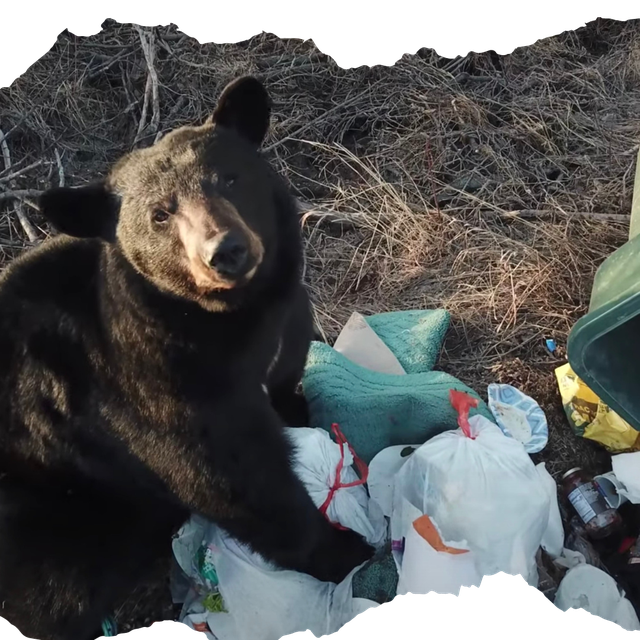
Bears in Town:
Bear-proof garbage cans are a requirement in the City of McCall. That requires residents to not only use the Bear-proof can but avoid overfilling it, propping it up, or tampering with the lock. Contact Lakeshore Disposal at (208) 634-7176 if you need additional cans, a repair, or a larger-sized trash can.
A letter regarding Bears from Idaho Department of Fish and Game:
Bears are continually on the hunt for food that’s high in protein and fat. Their memories and sense of smell are excellent. With a spotty and early berry crop this year, bears are looking for other food sources.
Unfortunately, if they find something tasty, they’ll remember that and visit again. If they continue to find food, your house and your neighborhood will become a regular stop on their circuit.
When neighborhoods become a regular food source, bears become more accustomed to and less fearful of people. They can grow impatient or even pushy in their search for food, and may not leave when you try to scare them away because the promise of food overcomes their fear of people. These bears can become dangerous.
IDFG monitors all bear reports. When it becomes evident that a bear has become excessively habituated or has lost its wariness of humans, IDFG often has no choice but to trap and kill the bear. These bears cannot be moved, because research shows they will quickly travel long distances to seek out human foods in their new locations. We cannot responsibly move a habituated bear knowing it will likely visit the nearest campground or neighborhood.
A fed bear is a dead bear. McCall sits right in the middle of bear habitat, so bears will always move through town looking for good smells and food. Help make sure bears don’t find human food sources.
Following the steps below helps protect both you and the bears:
- Remove bird feeders between April and mid-November.
- Feed pets inside.
- Get a bear-resistant trash can and use it properly; don’t tamper with latches, prop them open, or over fill them. If you don’t have a bear-resistant can or if there is too much trash to fit in the can, keep it in a garage until the morning of pickup.
- Do not keep coolers, refrigerators, or freezers outside.
- If a bear has already visited your place and found food, take the above steps right away. The bear will likely pay you a couple more visits, but if it finds no food, it will eventually move on.
- Report bear problems to IDFG so that we can monitor the situation: (208)634-8137.
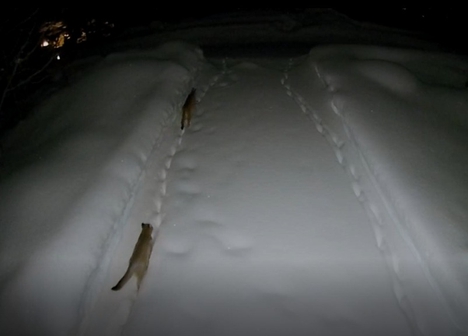
Mountain Lions In Town:
Most residents, even those who have lived there for years, have never seen a Mountain Lion. However, we are hearing from residents that they are now seeing them as they pass through their neighborhoods, especially on home security cameras.
Wildlife managers agree that if a person is in close proximity to a lion, they should:
- NEVER run away from a mountain lion. The lion’s instinct is to chase and ultimately catch what they perceive as potential prey.
- NEVER turn your back on a lion. Always face them while making yourself look as large as you can. Yell loudly, but don’t scream. A high-pitched scream may mimic the sound of a wounded animal.
- SLOWLY back away while maintaining eye contact with the lion.
- Safety equipment you may choose to carry could include bear spray, a noise device, like an air horn, and if you walk in the dark, a very bright flashlight.
- If you are attacked, fight back!
Remember to use all of your senses to detect if a mountain lion is nearby. Using a light to help see your surroundings is very important, both in your yard and in your neighborhood. If you run or bike for personal fitness, use caution when wearing headphones which take away your ability to hear if a lion, or any other wildlife, is giving you signals that you’re too close.
Other Articles to read: Mountain Lions Likely Spending the Winter in McCall
To Report Wildlife Violations:
Citizens Against Poaching (CAP) is a nonprofit organization established in 1981 in cooperation with Idaho Fish and Game. Callers may remain anonymous. Call 1800-632-5999 to report a violation. For more information regarding CAP, visit their website: citizensagainstpoaching.org.

